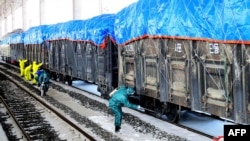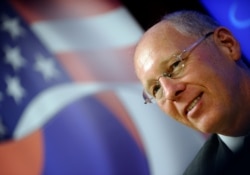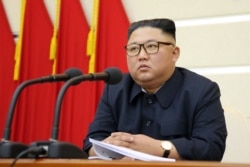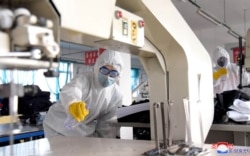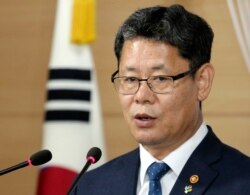Although Pyongyang has yet to report a confirmed case of the coronavirus, fear of its incursion is hampering Kim Jong Un’s promise to deliver economic prosperity, potentially undermining the legitimacy of his regime, said a former British ambassador to North Korea.
“I think the political and economic consequences of an outbreak would worry the regime greatly,” said John Everard, former British ambassador to North Korea, in an interview with VOA’s Korean Service.
Kim has "worked hard at trying to promote domestic prosperity," Everard said. "If that goes into reverse, I think a lot of people will start to become discontented, which might pose a threat to the regime.”
There are no confirmed cases of the virus in North Korea, but the country has been taking tough measures to keep it at bay.
In early February, Pyongyang closed the border it shares with China, where the global outbreak began in Wuhan. China has more cases than any other country where the virus is present. Over 80,000 people have been infected globally, and almost 3,000 people have died as of Wednesday.
That border accounts for about 95% of North Korea’s foreign trade, and closing it is expected to thwart North Korea’s economic activity, already hampered by sanctions.
The international community imposed sanctions on the country in 2016 to restrict and ban certain goods from entering and leaving, in order to prevent North Korea’s exports and imports from contributing to its nuclear weapons program.
“There are already severe economic consequences” as a result of the virus, Everard said. “Trade with China has been severely curtailed. It’s now not permitted to move goods across the border, which is where so much of the trade with China takes place.”
Sales of North Korea’s nonsanctioned items to China, including watches and fake eyelashes, grew rapidly from 2017 to 2019, according to 38 North, a website devoted to analyzing North Korea. North Korean food imports from China soared in 2019, 38 North said.
These economic activities have been significantly reduced by the border closure, fueling public dissatisfaction over how the regime is handling the virus.
“So, effectively, the restrictions are bringing North Korea’s foreign trade, if not quite to a standstill, to something very close to that,” Everard said. “If the virus continues to threaten North Korea, I suspect that it won’t be long before the regime has to consider closing down the markets.”
In April 2018, Kim vowed to focus on rebuilding his country’s economy, saying his country no longer needed to test nuclear weapons and intercontinental ballistic missiles, Everard said.
“The regime’s legitimacy, ever since the announcement of the new economic policy, effectively depends on delivering prosperity and well-being to the people of North Korea,” he said.
“Clearly, clamping down on the economic activities and the spread of a virus like this flies in the face of that objective. And it’s understandable that the regime is extremely nervous about the possible consequences of an outbreak,” Everard added.
Kim said there would be “serious consequences” if the epidemic spreads into North Korea, and ordered his officials to “seal off all the channels and space” penetrable by the virus, according to the country’s official Korean Central News Agency (KCNA) on Saturday.
Amid the virus scare, North Korea tested its missiles for the first time this year on Monday, which Everard thinks was aimed at sending a message internally to its regime, presumably Kim’s effort to boost his legitimacy.
Everard thinks North Korea may well have cases of the virus that authorities have not reported, or doctors may be unable to properly diagnosis COVID-19.
“The central regime, in the end, only knows what the provincial authorities tell it,” Everard said. “It may be that information about coronavirus cases is being suppressed at provincial levels or even below.”
Everard continued, “It’s quite possible that there are doctors out in the provinces or even close to the center who believe that they are observing patients who have the coronavirus but can’t confirm that because they can’t conduct the necessary tests.”
North Koreans are vulnerable to the infectious disease because their immune systems are weakened from undernourishment, Everard said.
“If the virus enters North Korea, it will both spread very rapidly, because the North Korean population is weakened by years of subadequate nutrition, which reduces the immune system. And also, the fatality rate might well be higher in North Korea than elsewhere.”
According to a United Nations report issued in March 2019, malnutrition is widespread in North Korea, with more than 43% of the population undernourished.
Everard said North Korea needs to provide international aid groups with full access to all areas of the country if it wants help preventing entry of the coronavirus or its spread, if it is already present.
“It would be great if the North Koreans would invite the World Health Organization to raise its presence in the country, (and) give it full access to all points in the country,” said Everard. “That, sadly, is unlikely to happen.”
Kun Li, regional communications officer for the U.N.’s World Food Program in Bangkok, told VOA’s Korean Service on Tuesday that “field visits have been limited, due to the quarantine” the government imposed on its staff.
Christy Lee and Ahn So-young contributed to this report that originated on VOA Korea.




